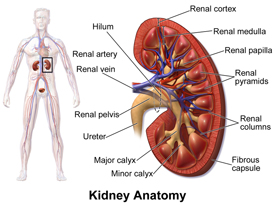Your collection kit will include the supplies you need and instructions for collection. Testing the urine to look for protein or blood and its chemical composition may help in indicating the presence of kidney disease.
Protein or blood should usually not be detectable in urine and are non-specific markers of kidney disease.

How to test kidneys. A blood test and a urine test are used to find kidney disease. The test measures the levels of a waste product called creatinine in your blood. Blood spot tests require only a fingerstick with a lancet.
This is a process that involves inserting a. In some cases doctors may want to perform a kidney biopsy. To check for kidney disease health care providers use a blood test that checks how well your kidneys are filtering your blood called GFR.
GFR - A blood test measures how much blood your kidneys filter each minute which is known as your glomerular filtration rate GFR. Urine tests can also detect whether the kidneys are leaking abnormal amounts of protein a sign of kidney damage. Blood and urine tests show how well the kidneys are doing their job and how quickly body wastes are being removed.
Because you are at risk you should get these tests regularly. They help identify problems with the. A lab technician can test a kidney tissue sample.
Many of the tests used by Walk-In-Labs home kidney testing kits use either a blood or urine sample collected at home. A physician should determine whether further specific workup andor a referral to a. Too much albumin in your urine is an early sign of kidney damage.
The main test for kidney disease is a blood test. Therefore if you have an abnormal result you may need further tests to find the cause of a kidney problem. Urine tests other blood tests scans X-rays kidney biopsy etc.
Kidney function tests are simple blood and urine tests that check whether your kidneys are working properly by measuring the levels of markers. Glomeruli are the tiny filters in the kidneys that filter waste from the blood. To test your kidney function your doctor will order a set of tests that can estimate your glomerular filtration rate GFR.
Your doctor will do a physical exam and order blood urine and imaging tests. GFR is a measure of kidney function and is performed through a blood test. Blood tests typically check urea eGFR estimated glomerular filtration rate and creatinine and can be taken from home with an at-home lab test.
Your GFR tells your doctor how quickly your kidneys are. GFR stands for glomerular filtration rate. Healthy kidneys remove wastes and excess fluid from the blood.
Know your stageACR is a urine test to see how much albumin a type of protein is in your urine. The blood and urine tests may reveal if your kidneys. Specifically it estimates how much blood passes through the glomeruli each minute.
The imaging tests can show your doctor if there are any kidney abnormalities. Glomerular filtration rate GFR is a test used to check how well the kidneys are working. Get a diagnosis of chronic kidney disease.
If the blood test is abnormal it cannot say what is causing the kidney problem. Your doctor uses your blood test results plus your age size gender and ethnic group to calculate how many millilitres of waste your kidneys should be able to filter in a minute. Your GFR will determine what stage of kidney disease you have there are 5 stages.
There are a handful of different kidney function tests that can be used to check in on your kidneys these include a blood test imaging test or urine test. Topics covered include patient position probe position landmarks and. The routine kidney blood test is a general marker of kidney function.
Urine samples will be placed in a supplied collection device.
